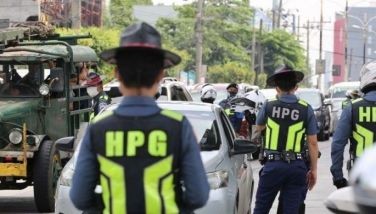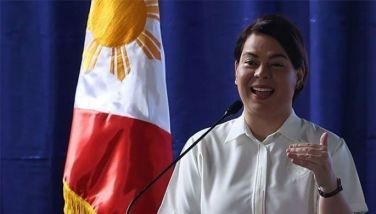Malacañang hails SC ruling on absentee voting

July 13, 2003 | 12:00am
Malacañang hailed yesterday the Supreme Court (SC) decision affirming the legality and constitutionality of the absentee voting law as a "landmark" ruling that would finally enable more than six million Filipinos abroad to exercise their right to vote in the May 2004 elections.
Presidential Spokesman Ignacio Bunye welcomed the SC ruling that said the Overseas Absentee Voting Act of 2003 (Republic Act 9189) is constitutional, contrary to claims made by election lawyer Romulo Macalintal.
"This is a landmark decision and we know that this absentee voting has long been pushed by President Arroyo, even during her trips abroad where we have so many overseas Filipino workers (OFWs)," Bunye said.
He pointed out that the President promised the OFWs "that the government would work hard for its implementation. This decision of the Supreme Court, I believe, would be welcomed by everyone."
Mrs. Arroyo earlier ordered that additional funds be included in the proposed 2004 budget to allow the Commission on Elections (Comelec) to carry out absentee voting in the next year’s elections.
The Comelec has conducted seminars in Philippine embassies on how to conduct the absentee voting system, which is one of the electoral reforms — along with computerized voting and counting — the President promised to implement when she declared last Dec. 30 that she would not run in the 2004 presidential elections.
Earlier, the SC, voting 9-4, upheld a provision in the absentee voting law allowing Filipino immigrants and permanent residents abroad to vote in the 2004 national elections as long as they fulfill certain conditions.
Close to two million out of an estimated eight million Filipinos living overseas are expected to register for the absentee voting, according to the Department of Foreign Affairs.
Macalintal said that under Section 1, Article 5 of the Constitution, a citizen may exercise suffrage, among other rights, if he has "resided in the Philippines for at least one year" and for at least six months "immediately preceding the election" in the place where he or she will vote.
Section 5(d) of RA 9189 allows a Filipino immigrant or permanent resident to vote if he executes an affidavit declaring that he will "resume actual physical permanent residence" in the Philippines within three years from registration as a voter and that he or she has not applied for citizenship in another country.
Macalintal said emigration to another country, which entitles a person to reside there permanently, constitutes abandonment of domicile in the Philippines.
But the Supreme Court ruled "the affidavit required in Section 5(d) is not only proof of the intention of the immigrant or permanent resident to go back and resume residency in the Philippines, but more significantly, it serves as an explicit expression that he had not, in fact, abandoned his domicile of origin."
Without the affidavit, the SC said Filipinos abroad will be presumed to have abandoned their residence in the Philippines.
The SC also noted that under Section 9 of RA 9189, registered absentee voters who fail to vote for two consecutive national elections will be removed from the National Registry of Absentee Voters.
Should these voters fail to return within three years, their names will be deleted from the registry and will be permanently disqualified to vote, the SC said.
As for the votes cast by absentee voters who later fail to return within three years, the SC said they shall not be invalidated because the voters were qualified at the date of the elections.
The SC, to further justify the constitutionality of Section 5(d), said that RA 9189 was passed pursuant to Congress’ mandate to provide for a system of voting by qualified Filipinos abroad, under Section 2, Article 5 of the Constitution.
The SC also ruled that the Comelec’s power to proclaim the winning candidates for senator and party-list representatives was constitutional. Congress, however, has the power to canvass the votes and proclaim the winning candidates for president and vice president under Section 4, Article 7 of the Constitution.
The High Court struck down some portions of RA 9189, namely Sections 17.1, 19 and 25, agreeing with Macalintal when he pointed out that the provisions of RA 9189 allowing the Joint Congressional Oversight Committee to "review, revise, amend and approve" the implementing rules and regulations the Comelec would promulgate for absentee voting are void, saying these were "an act of intrusion" into the poll body’s independence.
Presidential Spokesman Ignacio Bunye welcomed the SC ruling that said the Overseas Absentee Voting Act of 2003 (Republic Act 9189) is constitutional, contrary to claims made by election lawyer Romulo Macalintal.
"This is a landmark decision and we know that this absentee voting has long been pushed by President Arroyo, even during her trips abroad where we have so many overseas Filipino workers (OFWs)," Bunye said.
He pointed out that the President promised the OFWs "that the government would work hard for its implementation. This decision of the Supreme Court, I believe, would be welcomed by everyone."
Mrs. Arroyo earlier ordered that additional funds be included in the proposed 2004 budget to allow the Commission on Elections (Comelec) to carry out absentee voting in the next year’s elections.
The Comelec has conducted seminars in Philippine embassies on how to conduct the absentee voting system, which is one of the electoral reforms — along with computerized voting and counting — the President promised to implement when she declared last Dec. 30 that she would not run in the 2004 presidential elections.
Earlier, the SC, voting 9-4, upheld a provision in the absentee voting law allowing Filipino immigrants and permanent residents abroad to vote in the 2004 national elections as long as they fulfill certain conditions.
Close to two million out of an estimated eight million Filipinos living overseas are expected to register for the absentee voting, according to the Department of Foreign Affairs.
Macalintal said that under Section 1, Article 5 of the Constitution, a citizen may exercise suffrage, among other rights, if he has "resided in the Philippines for at least one year" and for at least six months "immediately preceding the election" in the place where he or she will vote.
Section 5(d) of RA 9189 allows a Filipino immigrant or permanent resident to vote if he executes an affidavit declaring that he will "resume actual physical permanent residence" in the Philippines within three years from registration as a voter and that he or she has not applied for citizenship in another country.
Macalintal said emigration to another country, which entitles a person to reside there permanently, constitutes abandonment of domicile in the Philippines.
But the Supreme Court ruled "the affidavit required in Section 5(d) is not only proof of the intention of the immigrant or permanent resident to go back and resume residency in the Philippines, but more significantly, it serves as an explicit expression that he had not, in fact, abandoned his domicile of origin."
Without the affidavit, the SC said Filipinos abroad will be presumed to have abandoned their residence in the Philippines.
The SC also noted that under Section 9 of RA 9189, registered absentee voters who fail to vote for two consecutive national elections will be removed from the National Registry of Absentee Voters.
Should these voters fail to return within three years, their names will be deleted from the registry and will be permanently disqualified to vote, the SC said.
As for the votes cast by absentee voters who later fail to return within three years, the SC said they shall not be invalidated because the voters were qualified at the date of the elections.
The SC, to further justify the constitutionality of Section 5(d), said that RA 9189 was passed pursuant to Congress’ mandate to provide for a system of voting by qualified Filipinos abroad, under Section 2, Article 5 of the Constitution.
The SC also ruled that the Comelec’s power to proclaim the winning candidates for senator and party-list representatives was constitutional. Congress, however, has the power to canvass the votes and proclaim the winning candidates for president and vice president under Section 4, Article 7 of the Constitution.
The High Court struck down some portions of RA 9189, namely Sections 17.1, 19 and 25, agreeing with Macalintal when he pointed out that the provisions of RA 9189 allowing the Joint Congressional Oversight Committee to "review, revise, amend and approve" the implementing rules and regulations the Comelec would promulgate for absentee voting are void, saying these were "an act of intrusion" into the poll body’s independence.
BrandSpace Articles
<
>
- Latest
- Trending
Trending
Latest
Trending
Latest
Recommended































